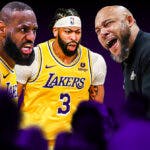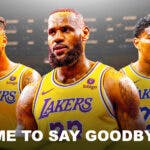It's become increasingly convenient to forget Michael Jordan's two-season stint with the Washington Wizards. The sustained struggles to re-capture the magic that earned him the distinction of greatest player ever even before coming out of retirement again in 2001, though, should nevertheless count as a chink in Jordan's armor when assessing whether a given player has a legitimate case to dethrone him from basketball's historic individual hierarchy.
LeBron James missing the playoffs for the first time since 2005, playing his first season in the Western Conference, serves as an interesting litmus test in that regard. There's been so much talk over the last three weeks about what James' failed debut campaign with the Los Angeles Lakers means for his legacy, but the context behind his team's disfunction has mostly been left out of that discussion.
Nevermind that the Lakers were in fourth place when James went down with a groin strain that cost him a month of play. Ignore the fact that Magic Johnson and Rob Pelinka, for reasons just as specious back then as they ultimately proved to be, added more ball-dominant non-shooters to a roster already full of them after James signed in Los Angeles. Injuries to Brandon Ingram and Lonzo Ball are apparently insignificant; James, on the court while dealing with an injury we recently learned normally needs six months to heal, was supposed to drag Lakers back into playoff positioning regardless.
It remains to be seen how history will look back on James' 2018-19 season, and that likely depends on how his tenure with Los Angeles unfolds going forward anyway. But it can already be said with confidence that he's unlikely get the pass Jordan has for his equally inconsequential, at best, return to the game for 2001-02 and 2002-03.
Reminder: The Wizards didn't make the playoffs in either of Jordan's years with the team. During his first season back, Jordan's 46.8 true shooting percentage was the lowest of all time for any player with a usage rate above 30.0, just a hair below Kobe Bryant's sideshow farewell tour. He adjusted in 2002-03, taking nearly four fewer shots per game and ceding some control of the offense to the newly-acquired Jerry Stackhouse and Larry Hughes, but Washington finished with the same 37-45 record it did one season earlier.
Jordan had his moments with the Wizards, of course. He totaled 96 points in back-to-back wins over the Charlotte Hornets and New Jersey Nets in December 2001. He made three game-winners in the 2001-2002 season alone. Who could forget his two-handed block on Ron Mercer? His ridiculous go-ahead fadeaway over Shawn Marion in the waning seconds of the fourth quarter of the 2003 All-Star Game, one his side would lose in overtime, is the stuff of typical legend. He'll probably be the only player ever age 40 or older to score 40 or more points in a single game.
So much of Jordan's place in history, though, is reduced to results over process when debating his legacy. Six titles and an undefeated Finals record is always used as the beginning, end, or both of the argument that his place atop the game is virtually indisputable. Jordan apparently showed the basketball world enough in the 1980s and 1990s to render his productive, inefficient, mesmerizing, ugly return in the early 2000s essentially moot, save for the fleeting moments mentioned above that made it heartwarmingly clear he was still Michael Jordan.
Why so many feel the need to do Jordan the favor of glossing over two years in Washington relates back to his status as a mythical figure more than anything else – an example of the maniacal competitiveness that drove him to greatness manifesting itself for the public one last time. But a judgment on his time with the Wizards far more worthy of his unrelenting desire to be the best is frankly acknowledging Jordan's labors, and the many factors that contributed to them – age, injury, a lack of talent and roster continuity first and foremost – while still labeling him the greatest player of all time.
Jordan's resumé should speak for itself; his legacy doesn't need the help of ignoring his second comeback. Whether or not some ultimately take a similar tack with James' time in Los Angeles, should ineffectual results deem doing so an option, will prove instructive for those who believe Jordan exists in a different sphere of the public consciousness than other historic greats.




